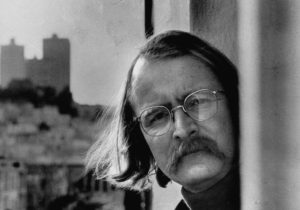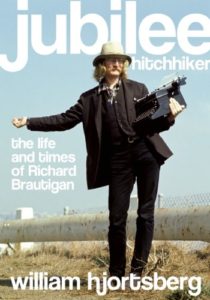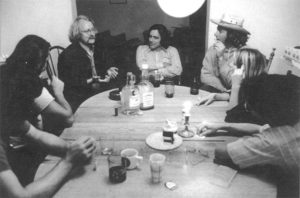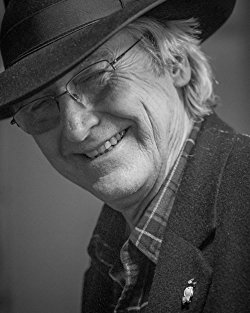The Hippie Poet
Appeared in Creative Loafing April 20, 2012

I’ve written several biographies and I’m kind of proud of them. But then I got this new biography of Richard Brautigan.
It’s as if I’m standing at the urinal, looking down, congratulating myself. You know, that’s not bad . . . I’m pretty good, I guess. Then William Hjortsberg walks up to the next urinal and unfurls a monster. “Water’s cold,” he muses. “Deep, too.”

Hjortsberg’s book, Jubilee Hitchhiker will inspire biography-envy in the heart of any writer who tries to tell the story of another human being’s life. This book is huge and absorbing and . . . well, tumescent. It’s rich with life and despite its extra-small type over 852 pages, it never ceases to be absorbing.
Brautigan was a key figure in my adolescence. He was the Great Hippie Poet, the writer every wannabe artiste in my high school wanted to emulate. As the author of Trout Fishing in America, The Pill Verses the Spring Hill Mine Disaster and In Watermelon Sugar, he was the quintessence of cool for my generation during those (1968-1972) years. We were the sons and daughters of liberal America in a bohemian university community, and Brautigan was our poet laureate.
He was the right writer at the right time. His poems were sometimes complex, but could also be mere snorts of whimsy and bemusement. Witness “Xerox Candy Bar”:
Ah, you’re just a copy of all the candy bars I’ve ever eaten

His novels broke the proscenium and made whole careers possible for generations of writers to follow. Insert Tom Robbins, David Foster Wallace and others here. And he looked out at us, from his book jackets, with that stoned and inscrutable face, droopy moustache, slouch hat, eyes crinkling at the corners with some private giggle. Hell, we all even tried to dress like him.
And then, one day in 1984, when the train was long gone, he shot himself to death. He wasn’t found for more than a month.
Hjortsberg, an accomplished novelist, was a close friend – and a Montana neighbor. That crowd around Livingston included writers Thomas McGuane, Hjorstberg, Tim Cahill, Philip Caputo, Guy de la Valdene and (these days) Jim Harrison; painter Russell Chatham; actors Jeff Bridges and Peter Fonda. Not a bad bunch of running buddies.
And they all loved Richard. They remain heartbroken. After Brautigan’s suicide, Hjortsberg announced that he intended to write a biography of his great friend. Twenty-five years in the works, it is here, after the author no doubt battled enormous odds – many of them emotional – to stitch together the life story of this gifted and difficult man.
Like all great biographies, it’s history. Hjorstberg puts his central character in the middle of a sweeping narrative that takes the country from the Great Depression into the Reagan Years.
Brautigan symbolized the hippie ethos that grew from San Francisco, where he was in the mid-Sixties. Tied to that generation and philosophy as he was, eventually the world passed him by, and he could not cope. I interviewed his friend, the great novelist Tom McGuane. He was talking about another friend, Hunter S. Thompson, but he could just as easily have been talking about Brautigan, another one of his generation’s more famous literary suicides: “He was a wonderful writer and he loved being a celebrity but, once again, that comes and goes. Literature is always there and writing is always there. They don’t come and go. If you get addicted to being popular, you’re hosed.”
Brautigan was a gentle soul and when the adulation passed him by, as it did so many icons of his generation, it was a difficult thing to grasp. He continued writing – it was always there for him – and he struggled with why, since he hadn’t changed, his audience had.

No wonder it took so long to write this book. Hjortsberg was writing an epic, not just a remembrance of a friend. He re-creates Brautigan’s childhood, his absent father, his painful adolescence, his emergence as the jester of hippie culture.
The book is masterful and recreating time and place. Everyone, it seems, has a Brautigan story. Most of them are funny. Hjortsberg was diligent in tracking down all of the stories, to give a full three-dimensional story better than anything Hollywood can throw at us. (Young folks! If you ever wished you had been born early enough to experience the joy and intensity of the Sixties, this book is as close as you can get to being there.)
Hjortsberg, as a novelist, is a genius at writing about place – whether it’s San Francisco in the hedonistic and idealistic Sixties, or Montana in the depressed and trickle-down 1980s. It is the fastest 852 pages you will ever read. It will open up to you the novels and verse of Richard Brautigan, which will give you a window on those long-lost times. It is a monster of a book – both in physical weight, and in emotional weight.
